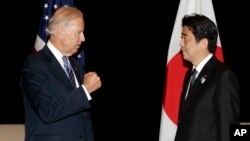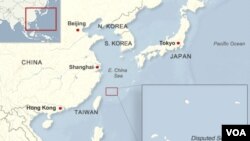U.S. Vice President Joe Biden and Japanese prime Minister Shinzo Abe have agreed to strengthen their nations' alliance amid growing tensions between Japan and China over a group of islands in the East China Sea.
The islands, known as Senkaku in Japan and as Diaoyu in China, are under Tokyo's control but also claimed by China. At a meeting in Singapore, Friday, Biden highlighted the U.S. view that all sides should take steps to reduce tensions. He also reaffirmed the U.S. position on the East China Sea, including its alliance commitments to Japan.
Abe explained his government security policy, including its review of national defense guidelines.
Japan's defense ministry issued a report Friday calling for stronger armed forces to deter increasing threats from China and North Korea. The report said that Japan should increase its surveillance capability and consider using drones or unmanned surveillance vehicles that would be operational at all times to monitor activities in the Pacific.
The paper also calls for the creation of an amphibious marine force to defend disputed islands, including the ability to attack foreign bases.
The Japanese prime minister told an academic audience in Singapore that Japan and china should hold high-level talks as soon as possible to resolve the dispute.
"I am of the opinion that there should be a leaders' summit meeting or a meeting between foreign ministers [of Japan and China] as soon as possible and for this there should be no preconditions," he said.
The Senkaku are located west of Okinawa in rich fishing waters, while the sea floor around them is believed to hold rich oil and gas reserves.
Japan also has a long-standing dispute with Russia over a group of islands that Russia occupied during World War Two and never left. North Korea has been a security threat for decades as its test-launched missiles often fall into Japanese waters.
After World War II, occupied Japan had to dismantle its military and adopt a constitution that allows the use of arms only in case of an attack on its territory. The so-called Self Defense Forces have been strengthened over the years along with the growth of Japan's economic power.
Japanese Defense Minister Itsunori Onodera on Friday introduced the plan for a more assertive force to reporters in Tokyo.
"The report covers comprehensive capability enhancements including warning and surveillance capabilities, amphibious functions, integrated transport, anti-ballistic missile response and capability, and based on these, it guides the focus of the direction that the Self Defense Forces should be taking as they move forward," he said.
The islands, known as Senkaku in Japan and as Diaoyu in China, are under Tokyo's control but also claimed by China. At a meeting in Singapore, Friday, Biden highlighted the U.S. view that all sides should take steps to reduce tensions. He also reaffirmed the U.S. position on the East China Sea, including its alliance commitments to Japan.
Abe explained his government security policy, including its review of national defense guidelines.
Japan's defense ministry issued a report Friday calling for stronger armed forces to deter increasing threats from China and North Korea. The report said that Japan should increase its surveillance capability and consider using drones or unmanned surveillance vehicles that would be operational at all times to monitor activities in the Pacific.
The paper also calls for the creation of an amphibious marine force to defend disputed islands, including the ability to attack foreign bases.
The Japanese prime minister told an academic audience in Singapore that Japan and china should hold high-level talks as soon as possible to resolve the dispute.
"I am of the opinion that there should be a leaders' summit meeting or a meeting between foreign ministers [of Japan and China] as soon as possible and for this there should be no preconditions," he said.
The Senkaku are located west of Okinawa in rich fishing waters, while the sea floor around them is believed to hold rich oil and gas reserves.
Japan also has a long-standing dispute with Russia over a group of islands that Russia occupied during World War Two and never left. North Korea has been a security threat for decades as its test-launched missiles often fall into Japanese waters.
After World War II, occupied Japan had to dismantle its military and adopt a constitution that allows the use of arms only in case of an attack on its territory. The so-called Self Defense Forces have been strengthened over the years along with the growth of Japan's economic power.
Japanese Defense Minister Itsunori Onodera on Friday introduced the plan for a more assertive force to reporters in Tokyo.
"The report covers comprehensive capability enhancements including warning and surveillance capabilities, amphibious functions, integrated transport, anti-ballistic missile response and capability, and based on these, it guides the focus of the direction that the Self Defense Forces should be taking as they move forward," he said.






